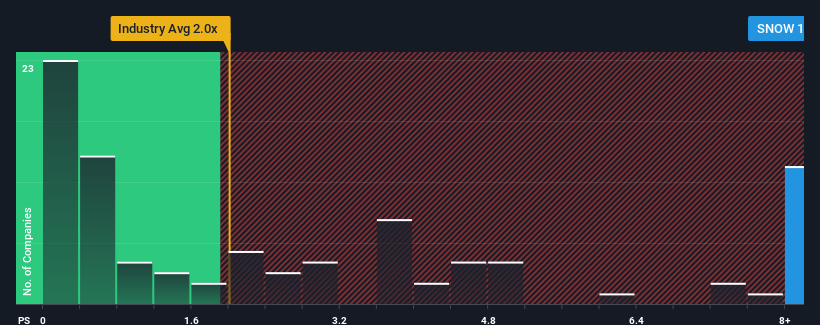- United States
- /
- IT
- /
- NYSE:SNOW
Snowflake Inc.'s (NYSE:SNOW) 27% Cheaper Price Remains In Tune With Revenues
Snowflake Inc. (NYSE:SNOW) shareholders won't be pleased to see that the share price has had a very rough month, dropping 27% and undoing the prior period's positive performance. Longer-term, the stock has been solid despite a difficult 30 days, gaining 24% in the last year.
Even after such a large drop in price, given around half the companies in the United States' IT industry have price-to-sales ratios (or "P/S") below 2x, you may still consider Snowflake as a stock to avoid entirely with its 19.1x P/S ratio. Nonetheless, we'd need to dig a little deeper to determine if there is a rational basis for the highly elevated P/S.
View our latest analysis for Snowflake

What Does Snowflake's P/S Mean For Shareholders?
With revenue growth that's superior to most other companies of late, Snowflake has been doing relatively well. The P/S is probably high because investors think this strong revenue performance will continue. However, if this isn't the case, investors might get caught out paying too much for the stock.
If you'd like to see what analysts are forecasting going forward, you should check out our free report on Snowflake.Is There Enough Revenue Growth Forecasted For Snowflake?
There's an inherent assumption that a company should far outperform the industry for P/S ratios like Snowflake's to be considered reasonable.
Taking a look back first, we see that the company grew revenue by an impressive 36% last year. The latest three year period has also seen an incredible overall rise in revenue, aided by its incredible short-term performance. So we can start by confirming that the company has done a tremendous job of growing revenue over that time.
Looking ahead now, revenue is anticipated to climb by 23% each year during the coming three years according to the analysts following the company. That's shaping up to be materially higher than the 12% per annum growth forecast for the broader industry.
With this information, we can see why Snowflake is trading at such a high P/S compared to the industry. It seems most investors are expecting this strong future growth and are willing to pay more for the stock.
What Does Snowflake's P/S Mean For Investors?
Even after such a strong price drop, Snowflake's P/S still exceeds the industry median significantly. Generally, our preference is to limit the use of the price-to-sales ratio to establishing what the market thinks about the overall health of a company.
Our look into Snowflake shows that its P/S ratio remains high on the merit of its strong future revenues. It appears that shareholders are confident in the company's future revenues, which is propping up the P/S. Unless the analysts have really missed the mark, these strong revenue forecasts should keep the share price buoyant.
It's always necessary to consider the ever-present spectre of investment risk. We've identified 2 warning signs with Snowflake, and understanding these should be part of your investment process.
If these risks are making you reconsider your opinion on Snowflake, explore our interactive list of high quality stocks to get an idea of what else is out there.
New: Manage All Your Stock Portfolios in One Place
We've created the ultimate portfolio companion for stock investors, and it's free.
• Connect an unlimited number of Portfolios and see your total in one currency
• Be alerted to new Warning Signs or Risks via email or mobile
• Track the Fair Value of your stocks
Have feedback on this article? Concerned about the content? Get in touch with us directly. Alternatively, email editorial-team (at) simplywallst.com.
This article by Simply Wall St is general in nature. We provide commentary based on historical data and analyst forecasts only using an unbiased methodology and our articles are not intended to be financial advice. It does not constitute a recommendation to buy or sell any stock, and does not take account of your objectives, or your financial situation. We aim to bring you long-term focused analysis driven by fundamental data. Note that our analysis may not factor in the latest price-sensitive company announcements or qualitative material. Simply Wall St has no position in any stocks mentioned.
About NYSE:SNOW
Snowflake
Provides a cloud-based data platform for various organizations in the United States and internationally.
Excellent balance sheet with limited growth.
Similar Companies
Market Insights
Community Narratives




